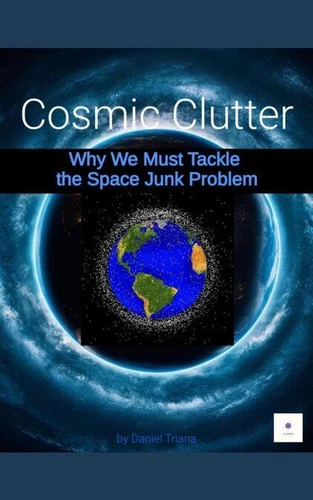Cosmic Clutter and Why We Must Tackle the Space Junk Problem
Par :Formats :
Disponible dans votre compte client Decitre ou Furet du Nord dès validation de votre commande. Le format ePub est :
- Compatible avec une lecture sur My Vivlio (smartphone, tablette, ordinateur)
- Compatible avec une lecture sur liseuses Vivlio
- Pour les liseuses autres que Vivlio, vous devez utiliser le logiciel Adobe Digital Edition. Non compatible avec la lecture sur les liseuses Kindle, Remarkable et Sony
 , qui est-ce ?
, qui est-ce ?Notre partenaire de plateforme de lecture numérique où vous retrouverez l'ensemble de vos ebooks gratuitement
Pour en savoir plus sur nos ebooks, consultez notre aide en ligne ici
- FormatePub
- ISBN8230884569
- EAN9798230884569
- Date de parution22/12/2024
- Protection num.pas de protection
- Infos supplémentairesepub
- ÉditeurIndependently Published
Résumé
In the vast expanse of space, an invisible threat looms above us-a growing crisis that could crash into your home at any moment. This is not a plot from a science fiction movie, but an urgent reality: space debris. As humanity's reach extends beyond Earth, we have left behind a trail of derelict satellites and satellite scrap that now orbit our planet like cosmic clutter in an attic. These remnants of past missions may seem distant and irrelevant, but their potential to wreak havoc is very real. Every year, thousands of pieces of this so-called space junk are added to our celestial backyard.
Each fragment travels at speeds up to 17, 500 miles per hour-fast enough for even the smallest piece to cause catastrophic damage if it collides with active satellites or spacecraft. The danger isn't just hypothetical; incidents where space junk has crashed into homes on Earth serve as stark reminders that this problem is closer than we might think. If left unchecked, this floating graveyard threatens not only future space exploration but also our everyday technologies here on Earth-from GPS systems to weather forecasting tools-all relying on satellites in perilous orbits.
Addressing this issue has never been more crucial for safeguarding both terrestrial life and the frontiers of discovery beyond our atmosphere.
Each fragment travels at speeds up to 17, 500 miles per hour-fast enough for even the smallest piece to cause catastrophic damage if it collides with active satellites or spacecraft. The danger isn't just hypothetical; incidents where space junk has crashed into homes on Earth serve as stark reminders that this problem is closer than we might think. If left unchecked, this floating graveyard threatens not only future space exploration but also our everyday technologies here on Earth-from GPS systems to weather forecasting tools-all relying on satellites in perilous orbits.
Addressing this issue has never been more crucial for safeguarding both terrestrial life and the frontiers of discovery beyond our atmosphere.
In the vast expanse of space, an invisible threat looms above us-a growing crisis that could crash into your home at any moment. This is not a plot from a science fiction movie, but an urgent reality: space debris. As humanity's reach extends beyond Earth, we have left behind a trail of derelict satellites and satellite scrap that now orbit our planet like cosmic clutter in an attic. These remnants of past missions may seem distant and irrelevant, but their potential to wreak havoc is very real. Every year, thousands of pieces of this so-called space junk are added to our celestial backyard.
Each fragment travels at speeds up to 17, 500 miles per hour-fast enough for even the smallest piece to cause catastrophic damage if it collides with active satellites or spacecraft. The danger isn't just hypothetical; incidents where space junk has crashed into homes on Earth serve as stark reminders that this problem is closer than we might think. If left unchecked, this floating graveyard threatens not only future space exploration but also our everyday technologies here on Earth-from GPS systems to weather forecasting tools-all relying on satellites in perilous orbits.
Addressing this issue has never been more crucial for safeguarding both terrestrial life and the frontiers of discovery beyond our atmosphere.
Each fragment travels at speeds up to 17, 500 miles per hour-fast enough for even the smallest piece to cause catastrophic damage if it collides with active satellites or spacecraft. The danger isn't just hypothetical; incidents where space junk has crashed into homes on Earth serve as stark reminders that this problem is closer than we might think. If left unchecked, this floating graveyard threatens not only future space exploration but also our everyday technologies here on Earth-from GPS systems to weather forecasting tools-all relying on satellites in perilous orbits.
Addressing this issue has never been more crucial for safeguarding both terrestrial life and the frontiers of discovery beyond our atmosphere.





















